Hey there, homeowner! Ever wondered how long those trusty deadbolt locks on your doors can really hold up? Well, you’re in for a surprise! Deadbolt locks are like the silent guardians of your home, keeping it safe and sound. But here is the kicker – they don’t last forever!
In this article, we are going to dive deep into the world of deadbolt locks and unravel the mystery surrounding their lifespan. Yep, there’s a secret hidden in those metal bolts that you definitely want to know about. So, stick around and get to know how long do deadbolt locks last because your home’s security might depend on it!
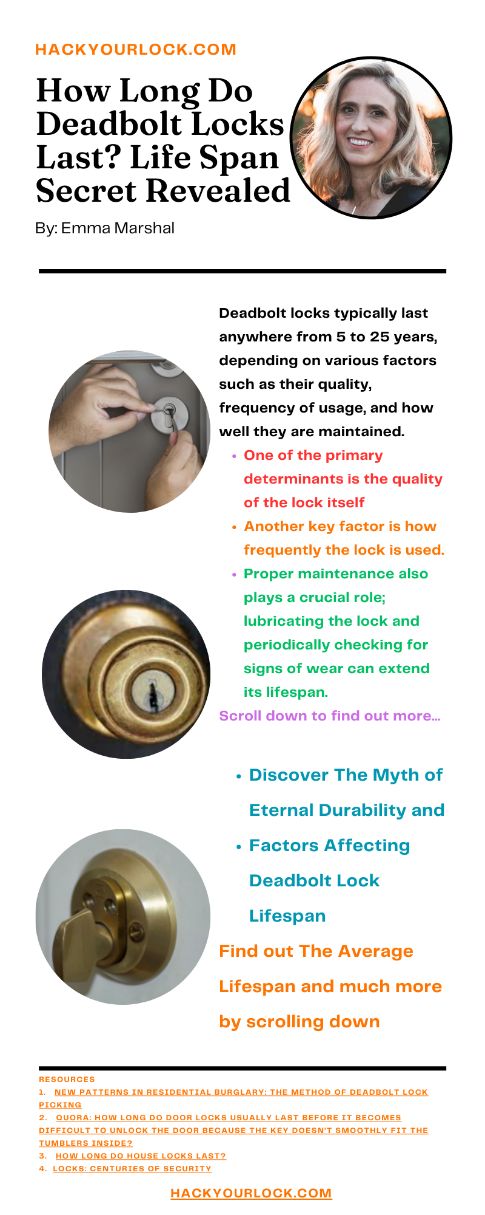
Contents
How Long Do Deadbolt Locks Last?
Deadbolt locks typically last anywhere from 5 to 25 years, depending on various factors such as their quality, frequency of usage, and how well they are maintained.
Deadbolt locks are a vital component of home security, but they aren’t immortal. Their longevity can vary significantly based on several critical factors.
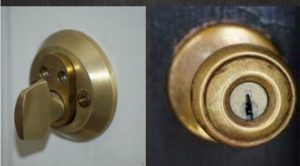
One of the primary determinants is the quality of the lock itself. High-quality deadbolts, often made of durable materials and precision engineering, tend to last longer than cheaper alternatives.
Another key factor is how frequently the lock is used. A deadbolt on the front door of a bustling household will naturally wear out faster than one on a rarely used back door.
Proper maintenance also plays a crucial role; lubricating the lock and periodically checking for signs of wear can extend its lifespan.
On average, a well-maintained deadbolt lock can serve your home security needs for around 15 years. However, some high-end models, when cared for meticulously, can last up to 25 years or more.
Signs of aging in deadbolt locks typically include difficulty turning the key, a loose or wobbly handle, or visible rust and corrosion.
If you notice any of these red flags, it’s a clear indication that your lock may need attention or replacement.
Scroll down if you want to know more about how long do deadbolt locks last.
The Basics of Deadbolt Locks
Deadbolt locks are the unsung heroes of home security. These specialized locks` are designed to provide an additional layer of protection beyond standard locksets or knob locks.
Role in Home Security
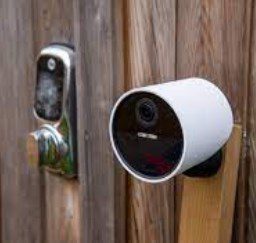
Locks are symbolic representation of Centuries of Security. What sets deadbolts apart is their unique mechanism, which requires the turning of a key or thumb turn to engage a bolt that extends deep into the door frame.
This deadbolt, once locked into place, forms a sturdy barrier that is extremely resistant to forced entry.
The result is enhanced security, making it significantly more challenging for intruders to gain unauthorized access to your home.
Deadbolt locks are typically installed on exterior doors, such as front and back doors, as well as side doors leading to garages and yards. How long do deadbolt locks last may also depend on their usage pattern.
Types of Deadbolt Locks Commonly Used In Households
There are two primary types of deadbolt locks commonly used in households: single-cylinder and double-cylinder deadbolts.
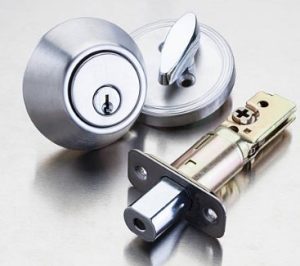
Single-cylinder deadbolts are the most prevalent and feature a key cylinder on the outside and a thumb turn on the inside to lock and unlock the door. Double-cylinder deadbolts, on the other hand, have key cylinders on both sides, requiring a key for both entry and exit.
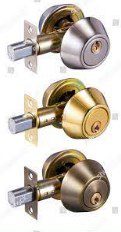
While double-cylinder locks provide enhanced security, they can pose safety concerns in emergencies as they may hinder quick egress.
How long do deadbolt locks last, as a single cylinder lock and a double cylinder lock, depends on convenience and effectiveness as well.
The choice between these two types largely depends on your security needs and personal preferences, with single-cylinder deadbolts being more common due to their convenience and effectiveness in most residential settings.
The Myth of Eternal Durability
There are myths which prevail about how long do deadbolt locks last. It is a common misconception that deadbolt locks last forever. While they are renowned for their durability, no lock is immune to wear and tear over time.
The belief in their eternal durability can lead homeowners to overlook the need for maintenance or replacement when signs of aging appear.
Deadbolt locks, like any mechanical device, have a finite lifespan influenced by factors such as usage, quality, and maintenance.
Even the sturdiest deadbolts will eventually show signs of wear, and it’s essential to understand that they are not invincible.
Relying solely on the myth of eternal durability can leave your home’s security vulnerable as locks age and become less effective in deterring break-ins.
Factors Affecting Deadbolt Lock Lifespan
Several key factors play a role in determining how long a deadbolt lock will last:
1. Lock Quality
The quality of the lock itself is paramount. High-quality deadbolts made from durable materials and precision engineering tend to have longer lifespans compared to cheaper alternatives.
Investing in a well-constructed deadbolt can pay off in terms of longevity. It is an important factor in deciding how long do deadbolt locks last.
2. Usage Patterns
How long do house locks last? depends on How frequently the lock is used. Deadbolts on frequently accessed doors, like front and back entrances, may wear out faster than those on less-used doors.
This is because every turn of the key or thumb turn contributes to gradual wear and tear.
3. Environmental Conditions
The environment in which the lock is installed matters. Harsh weather conditions, extreme temperatures, and exposure to moisture can accelerate wear and corrosion.
Proper protection, such as a cover or sealant, can help mitigate these effects.
4. Maintenance
Regular maintenance plays a crucial role in how long do deadbolt locks last. Its proper maintenance extends a deadbolt lock’s lifespan. Lubricating the lock with a suitable spray or powder reduces friction and minimizes wear.
Additionally, inspecting the lock for signs of aging and addressing them promptly can prevent further damage.
By considering these factors and taking proactive measures, homeowners can maximize the lifespan of their deadbolt locks, ensuring continued security for their homes and the deadbolt locks last longer.
| Factors Influencing Deadbolt Lock Lifespan | Ways to Enhance Lifespan |
| Lock Quality | Invest in a high-quality deadbolt lock |
| Usage Patterns | · Install deadbolts on less-used doors. |
| Environmental Conditions | · Protect locks from harsh weather with covers and sealants |
| · Keep locks away from direct sunlight. | |
| Maintenance | · Regularly lubricate the lock with silicon-based spray or graphite powder to reduce friction. |
| · Inspect locks for signs of aging and address them promptly. |
The Average Lifespan
Your query of “How long do deadbolt locks last?” requires an average lifespan as an answer. The typical lifespan of a deadbolt lock can vary widely based on factors such as quality, usage, and maintenance. On average, a well-maintained deadbolt lock can serve its security purpose for approximately 15 years.
However, it’s essential to note that this is a generalized estimate, and individual lock longevity can differ significantly.
Different types of deadbolt locks may exhibit varying lifespans. High-quality deadbolts, constructed with durable materials and precision engineering, often outlast cheaper alternatives.
Additionally, the type of deadbolt used can impact its longevity. Single-cylinder deadbolts, with a key cylinder on the outside and a thumbturn on the inside, are more common in residential settings due to their convenience and typically have lifespans within the average range.
Double-cylinder deadbolts, featuring key cylinders on both sides, can provide enhanced security but may require more meticulous maintenance and can last similarly if well cared for.
Hopefully this clears your query of how long do deadbolt locks last with an average lifespan mentioned.
Signs of Aging and Wear
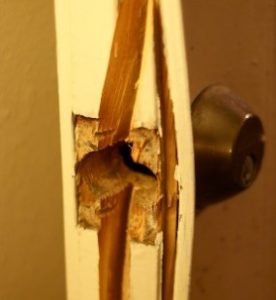
| Signs of Aging and Wear | Explanation |
| Difficulty turning the key | The key becomes hard to turn, indicating internal friction or damage. |
| Loose or wobbly handle | A loose or wobbly handle suggests wear in the locking mechanism. |
| Visible rust and corrosion | Rust and corrosion can weaken the lock, making it less secure. |
| The key doesn’t fit smoothly | When the key doesn’t fit smoothly, it may signal misalignment or damage. |
| Inconsistent locking/unlocking | Inconsistent locking or unlocking can indicate internal issues affecting the deadbolt’s performance. |
Extending the Life of Your Deadbolt Lock
| Tips for Extending the Life of Your Deadbolt Lock | Explanation |
| Proper installation for a secure fit | Ensure correct installation to prevent wear. |
| Regular lubrication for reduced friction | Apply lubricant for smoother lock operation. |
| Periodic maintenance and inspection | Check for wear, damage, and address promptly. |
| Protecting the lock from harsh weather | Shield from extreme weather to prevent corrosion |
| Ensuring a well-constructed strike plate | Use a sturdy strike plate to reinforce security |
| Choosing a high-quality deadbolt lock | Invest in a durable, well-constructed deadbolt |
The Ultimate Secret Unveiled
So, what’s the ultimate secret about how long do deadbolt locks last and their lifespan? It’s this: while deadbolt locks don’t last forever, their longevity can be significantly extended through proper care and maintenance.
The key to keeping your home secure for years lies in your hands, quite literally. By following the tips and strategies discussed earlier, you can ensure that your deadbolt lock serves its security purpose effectively for an extended period, providing you with peace of mind and safeguarding your home.
Remember, it’s not about eternal durability; it’s about responsible maintenance and proactive care that keeps your deadbolt lock in optimal condition.
Conclusion
In conclusion, the lifespan of deadbolt locks is influenced by various factors such as quality, usage, and maintenance. While they don’t last forever, understanding their average lifespan and recognizing signs of aging and wear is crucial for maintaining home security.
By practicing proper care, regular maintenance, and investing in quality locks, you can significantly extend the life of your deadbolt locks. So, when asking, “How long do deadbolt locks last,” remember that with the right precautions and attention, you can enjoy their protection for many secure years to come.
FAQ’s
What factors can affect the lifespan of a deadbolt lock?
Factors such as quality, usage, and maintenance can significantly influence the lifespan of a deadbolt lock.
How often should I lubricate my deadbolt lock?
It’s advisable to lubricate your deadbolt lock every 6-12 months to ensure smooth operation.
Can I extend the life of my existing deadbolt lock, or is replacement the only option?
You can extend the life of your deadbolt lock with proper care, but eventually, replacement may be necessary if signs of wear and aging appear.
Are there any signs of wear or aging I should watch out for in my deadbolt lock?
Look out for signs like difficulty turning the key, a loose handle, visible rust, or inconsistent locking/unlocking.
Does the type of deadbolt lock I choose impact its longevity?
Yes, the type of deadbolt lock can impact its lifespan. High-quality locks tend to last longer, while double-cylinder locks provide enhanced security but require maintenance.
How do environmental conditions like weather affect the lifespan of deadbolt locks?
Extreme weather conditions can affect lock longevity. To counter this, use covers or sealants to protect against corrosion.
What should I do if I notice rust or corrosion on my deadbolt locks?
If you notice extensive rust or corrosion, consider replacing or rekeying the lock to ensure security.
Is it advisable to rekey or replace a deadbolt lock as it ages?
Depending on the extent of wear, either rekeying or replacing the lock is advisable for maintaining security.
Are there any additional security measures I can take to complement the lifespan of my deadbolt lock?
Yes, you can reinforce door frames and invest in high-quality locks as additional security measures.
